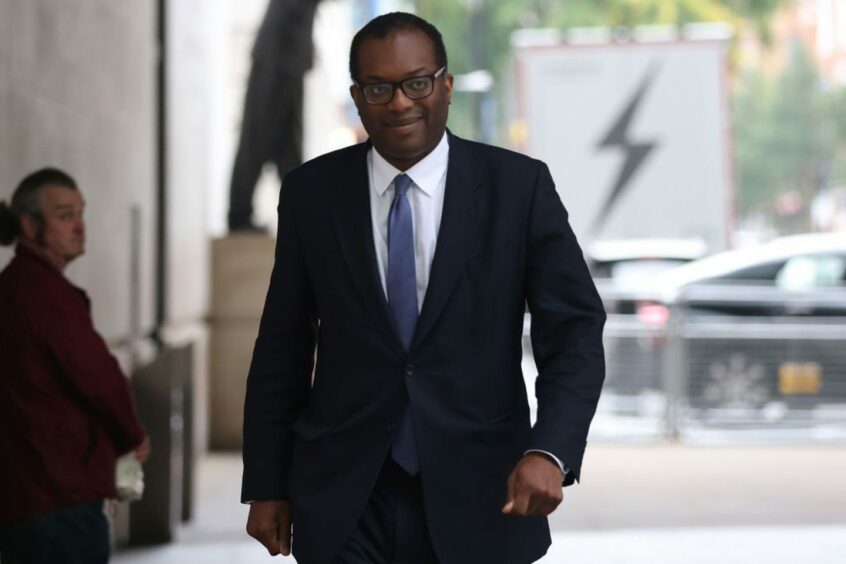
Former Chancellor Kwasi Kwarteng has raised doubts following Wednesday’s Autumn Budget as to whether the windfall tax on oil and gas profits will ever end.
“I opposed it when we introduced it in 2022,” Kwarteng said of the tax in an exclusive interview with Energy Voice, adding that nothing had yet made him change his mind: “There’s no way it’s going to end any time soon.”
As former secretary of state for Business, Energy and Industrial Strategy (BEIS) under the Conservatives, Kwarteng is frequently credited with being one of the architects of the Energy Profits Levy (EPL).
The so-called windfall tax was actually introduced in its original form in 2022 by then Chancellor Rishi Sunak, to curb what current Chancellor Rachel Reeves has called “war profits” when the oil price exceeded $100/barrel following Russia’s invasion of Ukraine.
The levy was originally due to expire in 2025, but its end date, known as the ‘sunset clause’, has been extended several times – with the latest budget confirming it will now be extended to March 2030.
‘Sheep and goats’
Chancellor Reeves confirmed on Wednesday that the government will close the 29% investment allowance tax “loophole” that has enabled oil and gas companies to get tax relief on investments in new oil and gas projects.
“I think that is a risk,” Kwarteng said of removing the tax relief, adding that there was “ongoing debate” as to what investment would qualify.
Kwarteng explained that his former department, led by Sunak, “carved out these investment allowances” because Sunak had realised there was “difficulty” in how the levy on oil and gas profits was conceived.
He said it was wrong to divide the energy industry into “sheep and goats”, because “in many cases it’s the same people doing both” renewable energy and oil and gas development – and that is why, in his words, Sunak “did the carve-out”.
Kwarteng said he had heard anecdotally from oil and gas companies that the North Sea energy transition is being accelerated by the tax policy he played a role in instituting.
“There’s a general feeling that the North Sea is going to change, and that change is going to happen more quickly than people realise,” said Kwarteng. “Largely, it’s being driven by tax policy.”
The Labour government has taken action to increase the tax incrementally from November.
‘Fallen apart’
Reeves confirmed on Wednesday that the windfall tax on oil and gas profits will increase from 35% to 38% from 1 November, which will increase the headline rate of taxes on oil and gas firms from 75% to 78%.
Meanwhile, the 29% investment allowance was scrapped, but Reeves retained the 100% first-year capital allowance and a 66% decarbonisation allowance.
As a former parliamentary under-secretary, Kwarteng said of past budgets: “I’ve seen how frankly they have fallen apart.”
“If we were to end the North Sea, or end it as a producer of gas, we would simply be importing huge amounts of gas,” he said.
Kwarteng pointed out that companies such as BP with carbon capture, Shell with hydrogen, and TotalEnergies new energies – “all these players are heavily invested in renewables”.
He said that if people “put their shovels down and leave”, the situation could “turn quickly”, adding that he was unsure whether existing “green industries will be enough” to cover a possible energy deficit.
“Can you ramp up these businesses quickly enough… to offset what is an increasingly challenging scene… for traditional industries in the North Sea?” Kwarteng asked.
This leaves traditional companies with little choice but to diversify beyond oil and gas under the existing regime, according to Kwarteng.
“I think the North Sea will have to transform itself beyond fossil fuels,” Kwarteng said. “I think that’s very much the direction of the government.”
‘Right thing’
Reeves said on Wednesday that her party’s task is “to begin a decade of national renewal” and that it falls on this government to “rebuild Britain”.
The Chancellor said her party is “committed to reform” the EPL on oil and gas companies, announcing an end to “short-termism”.
The government is relying on establishing Great British Energy, which will be headquartered in Aberdeen, as one pillar of its energy policy.
“I think the government is doing the right thing in terms of green renewable policy,” Kwarteng said.
“I was very keen on that when I was the energy secretary,” he added, saying “it’s important we put our money where our mouth is” on such projects.
However, despite Reeves’ claims that government will support jobs and “energy security”, Kwarteng raised doubts as to whether policies in the latest Budget will preserve “jobs and economic activity” in places such as Aberdeen and the North of Scotland.
“I think, very broadly, that the Chancellor had very little room for manoeuvre”, he said, adding that in the political context, she “did what she had to do”.
Kwarteng said that in “trying to get rid of” the levy, it would actually contribute to the approximately £22 billion financial black hole that Labour now faces.

